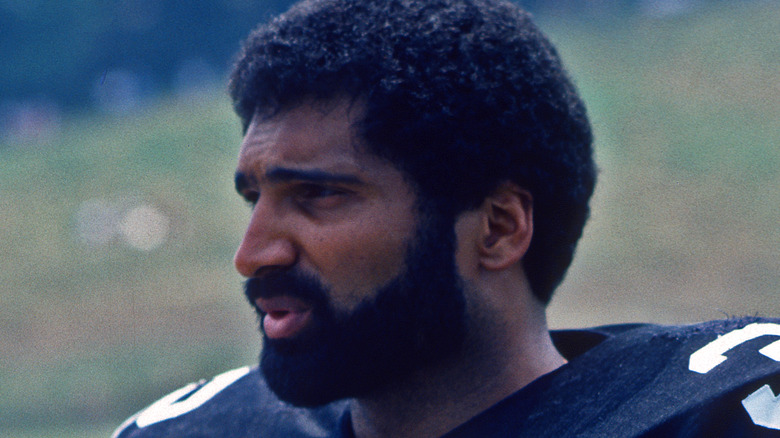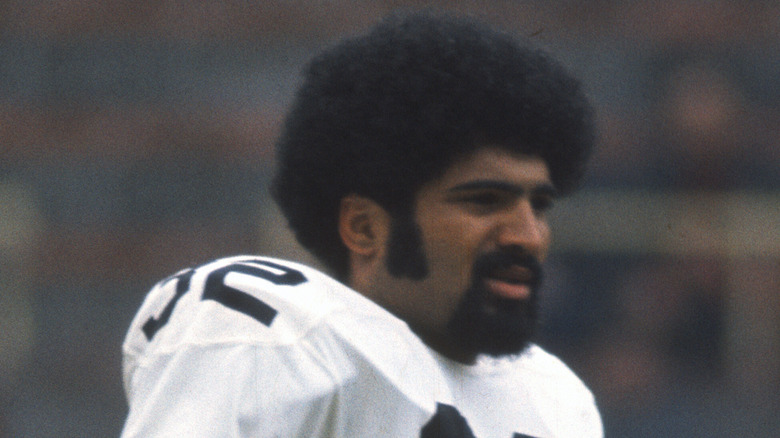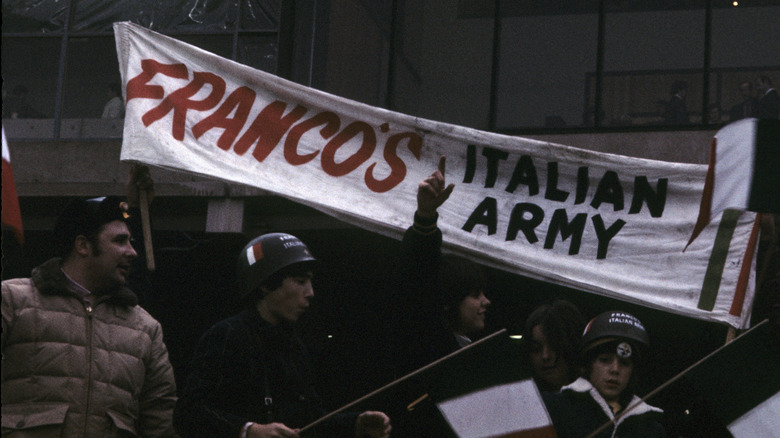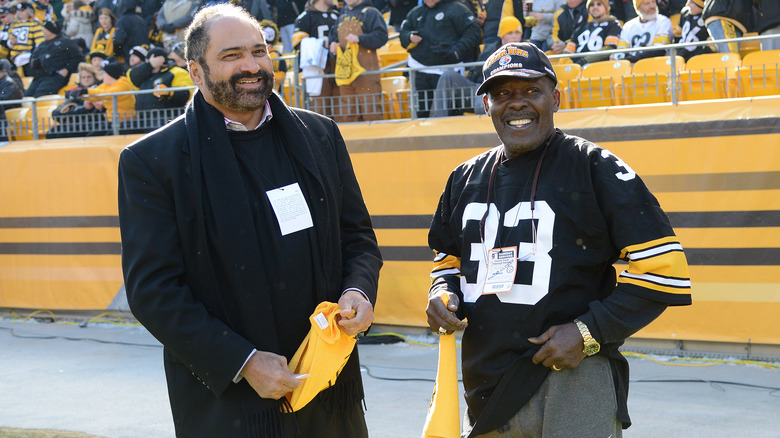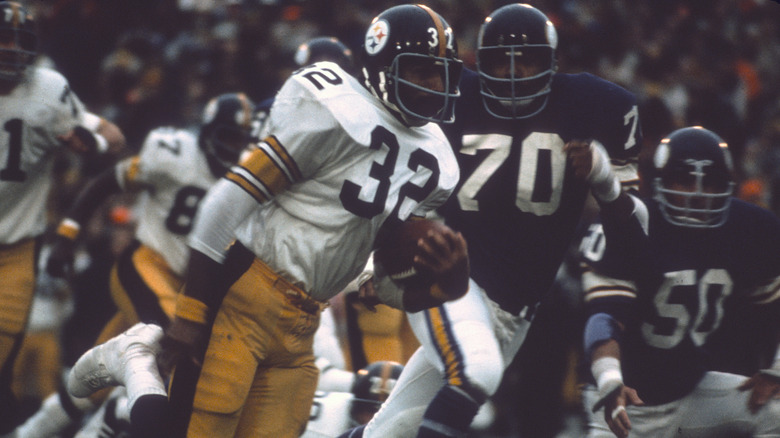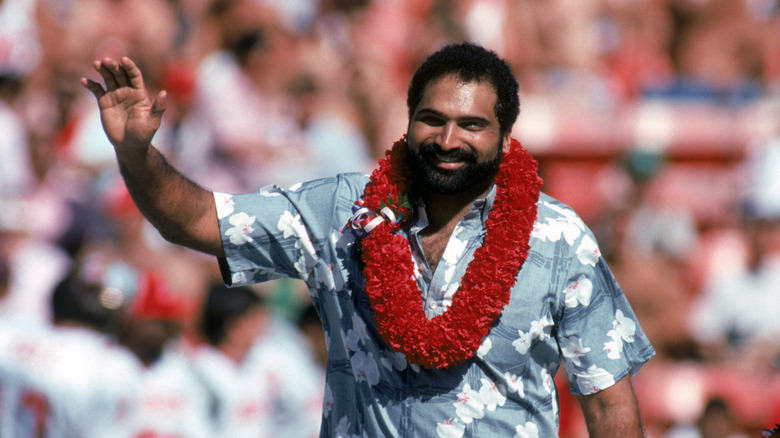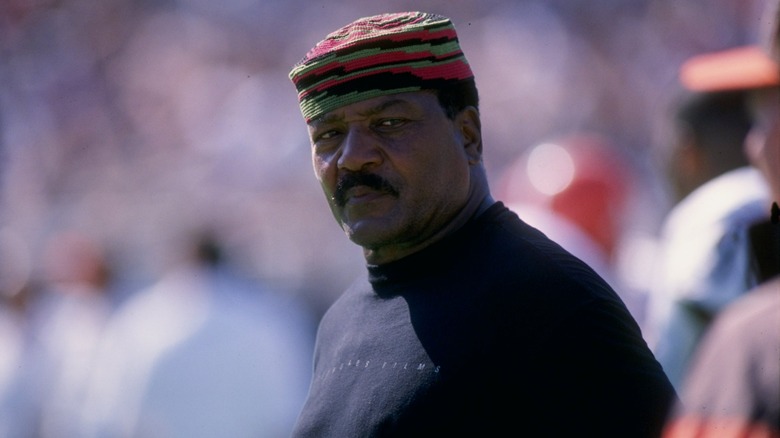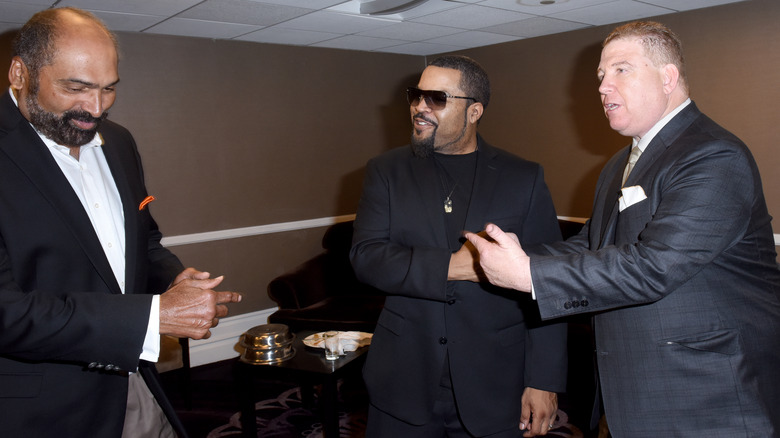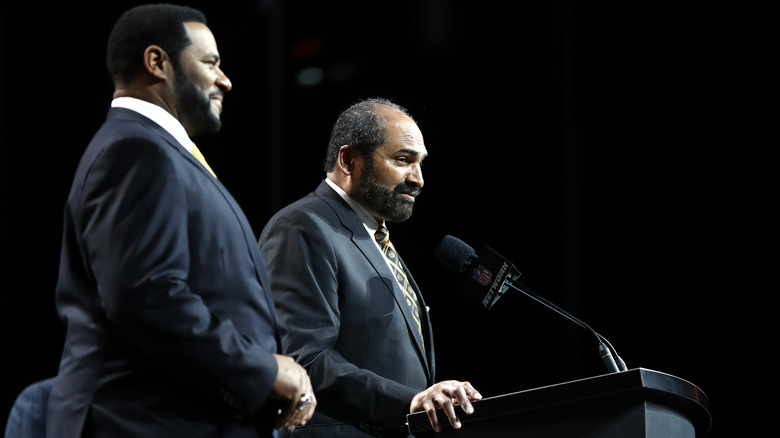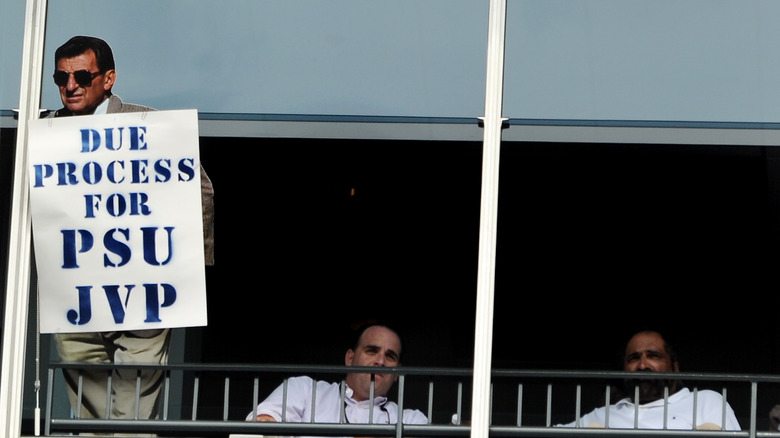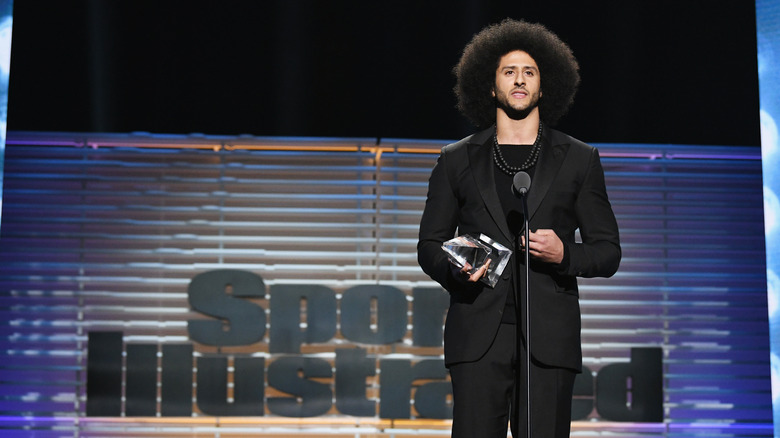The Untold Truth Of Franco Harris
Prior to the 1972 NFL season, the Pittsburgh Steelers were one of the least successful franchises in the sport. According to Pro-Football-Reference, from 1933-1971, the team had only seven seasons where they finished with more wins than losses and only one postseason appearance. That all changed in 1972 when the team used their first round pick in that spring's draft to select Penn State University's star running back, Franco Harris. Over the next eight years, the Steelers would make the postseason every year and win four Super Bowls. While the entire team was full of talented players, defensive tackle "Mean" Joe Greene said in an 1989 interview that Harris was the catalyst of their success. "Franco really showed us that we could win. Because before Franco, we did not win."
Harris' rookie season ended with the team making their first postseason appearance since 1947 and a playoff victory. The Pro Football Hall of Fame says Harris became just the fourth player with over 1,000 rushing yards in his first season. By the end of his time in Pittsburgh, Harris and the Steelers would see even greater success.
Here is the untold truth of Franco Harris.
Football was a 'means to an end'
As told by the Baltimore Sun, Franco Harris was the son of Army Sgt. Cad Harris and Italy native Gina Parenti. Cad Harris worked in the Fort Dix hospital in New Jersey as a supply officer, as well as holding other part-time jobs on the side. Gina Harris worked as a cafeteria worker and attempted to start her own Italian coffin business. A tremendous work ethic was instilled in him at a very young age.
Franco and his older brother, Mario Harris, worked a variety of jobs throughout their childhoods, such as busing tables and selling newspapers. "Something hit me when I was about 8 that I wanted to be in business," Franco Harris told the Sun.
When Franco was not working, he was playing sports, though football was not his first love. In fact, he only saw football as a "means to an end" to get a free college education and degree that would undoubtedly set him up for success in a career not revolving around football. He settled on Penn State, because as the Sun details, it offered a good hotel- and restaurant-management course and no athletic dorms.
Frank Sinatra was a fan
As "America's Game" explains, by 1972, the Steelers were rising from one of the worst teams in football to a new contender. With their rising success, Pittsburgh fans began an interesting practice to cheer for their players. Steeler players got their own fan bases within the stadium, and no fan base was more popular throughout all of Pittsburgh than "Franco's Italian Army."
Founded by two Steeler fans — Al Vento, a local pizza owner, and his baker friend Tony Stagno — the pair got a thumbs up from Harris himself to lead "Franco's Italian Army," as told by the documentary of the same name. Showing up to games with army helmets and waving Italian flags, fans watched as the rookie Harris blossomed and led Pittsburgh's offensive game. The army grew in size and popularity, with Israeli, Irish and Black fans all coming together.
Before the final game of the season, "General" Myron Cope, the Steelers' radio broadcaster, and the founders were able to net the army its most famous member, Frank Sinatra. As the Post Gazette details, Sinatra showed up at a practice to be "inducted." When the Steelers won their final game, netting them a playoff spot and home-field advantage in their first postseason game, Harris received a telegram: "Go Steelers Go," signed "Colonel Francis Sinatra."
Immaculate Reception voted as 'best play in NFL history'
On December 23, 1972, Pittsburgh hosted their rivals, the Oakland Raiders, in their first playoff game in a quarter-century, CNN reports. Down with seconds left, Steelers quarterback Terry Bradshaw threw a desperate pass in the middle of the field. What happened next was nothing short of a miracle, if you ask Steelers fans. Bradshaw's pass, meant for John "Frenchy" Fuqua, was knocked away by the Oakland Raiders' Jack Tatum. Franco Harris caught the deflected ball and ran it in for a game-winning touchdown. According to CNN, the NFL has named it the top play in the 100 years of the league.
However, the play itself is shrouded by controversy, leading Raiders fans and players to call the play "The Immaculate Deception," as detailed in the documentary, "A Football Life." Essentially debate revolves around whether another player touched the ball and whether the ball touched the ground, thus making Harris' catch invalid. A third conspiracy is that officials allowed the touchdown to stand after fearing for their safety when the crowd poured onto the field in celebration.
Whether the play was a farce or clean, the fact remained that Pittsburgh walked off the field with a victory, and Harris walked off a football legend.
Franco Harris set records
According to ESPN, the Pittsburgh Steelers between 1975-76 and 1979-80 became the first team to win four Super Bowls, winning back-to-back titles twice. In their run-first offense, Franco Harris carried the team's offensive load. In the four Super Bowls, as well as in the postseason altogether, the star fullback set new marks that still stand today.
According to NFL Network, in the Steelers' first Super Bowl victory, Super IX, Harris would break the Super Bowl record for most rushing yards in the game by running for 158 yards on 34 carries (another record at the time, according to CBS Sports) and scoring one touchdown in a 16-6 victory. Harris was named the game's MVP, and Pittsburgh would have their first of four championships.
Pittsburgh would find themselves in the postseason for the rest of the decade, and Harris continued to shine. As told by NFL Network's "Top 10 Steelers," Harris would become the first running back to score four touchdowns in the Super Bowl. He would also hold the postseason records upon retirement for rushing yards (1,556) and touchdowns (17) over the course of 19 postseason games, Pro Football Hall of Fame reports. Harris still holds the Super Bowl record for attempts (101) and rushing yards (354) today, Sportspool reports. "When someone tells me a regular season game is the same as a championship game, not to me it isn't," Harris said about playing in the Super Bowl.
His career ended reluctantly
By 1984, Franco Harris was a guaranteed Hall of Famer and on pace for breaking Cleveland's Jim Brown's all-time rushing record. He had also been in the league for a dozen seasons, as told by Pro Football Reference. Despite spending his career as a Steeler, his last days on the team were anything but happy.
According to UPI, Harris was only 362 yards away from the all-time rushing record. Because of this and his years of productivity with the Steelers, the veteran fullback desired a new contract. Pittsburgh denied the request, and Harris responded by not reporting to the Steelers' training camp. Pittsburgh released their disgruntled veteran right before the 1984 season.
He was picked up soon after by the Seattle Seahawks, where he would not only fail to reach Brown's record but be passed by Chicago Bears' Walter Payton, who would break Brown's all-time rushing record. Seattle released Harris, who saw only eight games of action. For the next 10 months, Harris hoped to be picked up by another team, but his age and low production in Seattle scared teams away. The Los Angeles Times reports the 35-year-old Harris retired from professional football in August 1985.
Jim Brown was not a fan of Franco Harris
A decade before Franco Harris was drafted, Jim Brown was reigning (and running) over the National Football League. Brown, despite only playing nine years and retiring at 29-years-old, as per Pro-Football Reference, is still considered one of the greatest players in the sport's history. With all of Brown's accolades, he sparked a feud with Harris when he began to close in on Brown's all-time rushing record. Speaking to the New York Times in November 1983, Brown had some unflattering words for Harris: ”I have the greatest respect for Franco Harris, but he is just hanging around to try to break my record. Even if Franco breaks my record by 500 yards, I will come back.”
A month later, Brown said to Sports Illustrated, "Gaining 1,000 yards in a 14-game season is like walking backwards. Gaining 1,000 yards in a 16-game season isn't even worth talking about. The standards today are lower, the conditions are easier and the expectations are less ... If Franco hangs around long enough and keeps running out of bounds, he'll get my record." He spent the interview also complaining that the league had lost its "passionate human spirit."
While Brown lambasted Harris, he treated Walter Payton, the man who broke his record, like a brother. Brown presented the late Payton on NFL Network's "NFL's 100 Greatest Players." While Harris did not break Brown's record, he did get revenge by beating Brown in a televised race, the Los Angeles Times reports.
Franco Harris Campaigns for Medical Cannabis
Speaking to the Pittsburgh Post-Gazette, Franco Harris considers himself lucky he has not suffered from long term health issues like his contemporaries and has a solution if he begins to experience pain because of his NFL career. "I've been pretty lucky all the way back to high school. I'm even more amazed that at 67 I'm not dealing with more issues ... if it ever comes to a point where I do need pain management, I'd feel very lucky and happy now that we have medicinal marijuana in Pennsylvania." His support of the cannabis industry is in contrast to the NFL's stance in not recognizing its use for pain management.
According to Mary Magazine, Harris is the chairman of Laurel Green Medical, LLC, and led a push along with Mayor John Fetterman of Braddock, Pennsylvania, to establish a growing and processing factory in the city, saying it could boost the city's economy. In spite of the NFL's policy against medical marijuana, Harris said that if the city where teams are located allow for medical usage, then the league should follow suit.
Politics in the Harris home
While football certainly was a constant presence in the Harris household, another presence was politics. Even today, while Franco Harris has been retired from football for nearly four decades, he and members of his family have been engaged in politics in Pennsylvania. According to the Pittsburgh Post-Gazette, Harris, Philadelphia 76ers guard Ben Simmons, and New Jersey Sen. Cory Booker held a Zoom call rallying Pennsylvania voters to support then-Presidential candidate Joe Biden.
Speaking at a "Get Out the Vote" event during the 2020 election season, hosted by the Black Political Empowerment Project (B-PEP) and Campaign for Power, Harris had this to say, Pittsburgh Action News reports: "I'm asking everybody to get off the bench. The fourth quarter is win or lose. This is it. This is the fourth quarter, this is it right now."
It is not just the family's patriarch that has given his voice to political matters. According to CBS News 19, Harris' wife, Dana Dokmanovich, helped Biden on the campaign trail. The couple's son, Dok Harris, made multiple attempts at local politics, running for mayor of Pittsburgh then for a seat in the city council. Both ended unsuccessfully, as told by WPXI News.
Franco Harris stood behind coach Joe Paterno
Few colleges have churned out as many star running and fullbacks as Penn State University, NCAA.com reports. From Lenny Moore in the 1950s to Saquon Barkley in the 2010s, Franco Harris is just one of many great backs from PSU. Unfortunately, in the beginning of the 2010s, Penn State became embroiled in one of the most disturbing scandals in sports history.
According to NPR, former assistant coach Jerry Sandusky was arrested on 52 counts of sexual abuse in 2011. It was discovered during the investigation that longtime head coach Joe Paterno, as well as others, had known about Sandusky's actions and not contacted the police. Paterno was fired, leading Harris to defend his former coach, Bleacher Report says. Harris' comments led to him being fired by Meadows Racetrack & Casino, who hired him and Rocky Bleier for events at the establishment.
According to the Postgame, he was also stripped of his chairman position on the board of Pittsburgh Promise, a local scholarship program. Despite calls to apologize for his defense of Paterno from many, including Pittsburgh's mayor Luke Ravenstahl, Harris maintained loyalty towards his college coach. In 2016, Harris defended his position and said that the university owed the now-departed Paterno an apology, 247 Sports reports.
If you or anyone you know has been a victim of sexual assault, help is available. Visit the Rape, Abuse & Incest National Network website or contact RAINN's National Helpline at 1-800-656-HOPE (4673).
He is not a fan of Colin Kaepernick
One area where Franco Harris and Jim Brown seem to find common ground is their disapproval of Colin Kaepernick's protest during the 2016 NFL season. To protest systemic racism and police brutality, Kaepernick kneeled during the playing of the national anthem.
Brown said of Kaepernick's protest, "I don't desecrate my flag and my national anthem," USA Today reports.
While Harris did acknowledge the social issues Kaepernick was highlighting, he also believed the football field was not the place for a quarterback to protest. "When he puts that suit on, it's not just about him, his position and the things that he wants to back and wants to believe in, because the team has to come first," he said (via Mediaite). Seeing as Harris' father was a military man, his stance against Kaepernick does not come as too much of a surprise.
